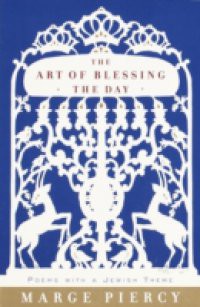Winner of the 2000 Paterson Poetry PrizeAbout Marge Piercy's collection of her old and new poems that celebrate the Jewish experience, the poet Lyn Lifshin writes: The Art of Blessing the Day is an exquisite book. The whole collection is strong, passionate, and poignant, but the mother and daughter poems, fierce and emotional, with their intense ambivalence, pain and joy, themes of separation and reconnecting, are among the very strongest about that difficult relationship.These striking, original, beautifully sensuous poems do just that. Ordinary moments--a sunset, a walk, a private religious ritual--are so alive in poems like 'Shabbat moment'and 'Rosh Hodesh.' In the same way that she celebrates ordinary moments, small things become charged with memories and feelings: paper snowflakes, buttons, one bird, a bottle-cap flower made from a ginger ale top and crystal beads. She celebrates the body in rollicking, gusto-filled poems like 'Belly good' and 'The chuppah,' where 'our bodies open their portals wide.' So much that is richly sensuous: 'hands that caressed you,. . . untied the knot of pleasure and loosened your flesh till it fluttered,' and lush praise for 'life in our spines, our throats,our knees, our genitals, our brains, our tongues.'I love the humor in poems like 'Eat fruit,' the nostalgia and joy in 'The rabbi's granddaughter and the Christmas tree,' the fresh, beautiful images of nature--'In winter . . .the sun hangs its wizened rosehip in the oaks.'I admire Piercy's sense of the past alive in the present, in personal and social history. The poems are memorials, like the yahrtzeit candle in a glass. 'We lose and we go on losing,' but the poems are never far from harsh joy, the joy that is 'the wine of life.'Growing up haunted by Holocaust ghosts is an echo throughout the book, and some of the strongest poems are about the Holocaust, poems that become the voices of those who had no voice: 'What youcarry in your blood is us,the books we did not write, music we could not make, a worldgone from gristle to smoke, onlyas real now as words can make it.'Marge Piercy's words make such a moving variety of experiences beautifully and forcefully real.

